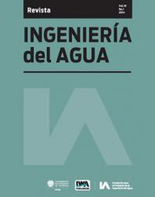
Ingenieria del Agua
Scope & Guideline
Uniting Science and Practice in Water Engineering
Introduction
Aims and Scopes
- Water Treatment and Quality Improvement:
Research focusing on technologies and methodologies for improving water quality, including wastewater treatment, disinfection processes, and the use of natural systems for filtration. - Hydrological Modelling and Analysis:
Development and application of hydrological models to understand water flow, sediment transport, and nutrient dynamics in various environments. - Sustainable Water Resource Management:
Studies aimed at optimizing water use, conservation strategies, and the implementation of integrated water resource management (IWRM) approaches. - Impact of Climate Change on Water Systems:
Investigations into how climate change affects water availability, quality, and management practices, with a focus on adaptation strategies. - Innovative Irrigation Techniques:
Exploration of new irrigation methods and technologies, including the use of sensors and models for efficient water application in agriculture. - Environmental Engineering Solutions:
Application of engineering principles to mitigate environmental impacts, particularly related to water systems, sedimentation, and pollution.
Trending and Emerging
- Microbial and Nature-Based Solutions:
An increasing focus on using biological techniques and nature-based solutions, such as constructed wetlands and microbial fuel cells, to treat wastewater and enhance water quality. - Smart Water Management Technologies:
The rise of smart technologies, including real-time monitoring and data analytics for urban water systems, is becoming a central theme, emphasizing efficiency and proactive management. - Impact of Microplastics on Water Ecosystems:
Research addressing the environmental effects of microplastics is gaining momentum, highlighting the need for effective mitigation strategies to protect aquatic ecosystems. - Integrated Flood Management Strategies:
There is a growing interest in integrated approaches to flood management that consider urban planning, green infrastructure, and climate resilience. - Hydrological Responses to Climate Change:
Studies examining the hydrological impacts of climate change, particularly in Mediterranean and tropical regions, are increasingly relevant as they inform adaptation strategies.
Declining or Waning
- Traditional Water Supply Systems:
Research on conventional water supply infrastructures is declining as the focus shifts towards more sustainable and integrated approaches, including decentralized systems and nature-based solutions. - Static Water Quality Assessment:
There is a noticeable decrease in studies that solely assess water quality at a single point in time, as researchers increasingly emphasize continuous monitoring and dynamic assessment methodologies. - Historical Water Management Practices:
Papers discussing historical practices in water management are becoming less common, suggesting a move towards contemporary challenges and innovative strategies rather than retrospective analyses.
Similar Journals
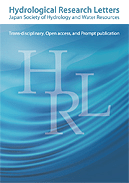
Hydrological Research Letters
Advancing Hydrology: Your Gateway to Innovative ResearchHydrological Research Letters (ISSN: 1882-3416) is a distinguished peer-reviewed journal published by JSHWR, JAGH, JAHS, JSPH in Japan. Established with open access since 2007, this journal serves as a critical platform for the dissemination of innovative research in the field of hydrology, water science, and technology. With an increasing impact factor, currently positioned in the Q3 quartile for both Earth and Planetary Sciences and Water Science and Technology, it attracts a diverse readership keen to stay abreast of groundbreaking findings that shape water management and environmental policy. Researchers, professionals, and students alike will find this publication an invaluable resource for enhancing their understanding of hydrological processes and their implications. The journal is committed to fostering open academic dialogue and encouraging high-quality contributions during its converging years from 2015 to 2024. For more information, authors and readers can access the journal at its address, C/O INT ACAD PRINTING CO, LTD, Shinjuku-ku, Tokyo, Japan.

Journal of Water Management Modeling
Innovating Water Management for a Sustainable FutureThe Journal of Water Management Modeling, published by COMPUTATIONAL HYDRAULICS INT, stands as a pivotal resource in the fields of Civil and Structural Engineering, Geography, Planning and Development, and Water Science and Technology. With an ISSN of 2292-6062, this Canadian-based journal has earned its reputation by exploring innovative modeling approaches to enhance water management, crucial in addressing today's environmental challenges. Despite its current Q3 status in Civil and Structural Engineering and Water Science categories, alongside a respectable Q2 rank in Geography, the journal is committed to advancing knowledge and fostering collaboration among researchers, practitioners, and students passionate about the sustainable management of water resources. The journal operates on an open-access model, ensuring research is readily available to a broad audience, and has converged its editorial focus from 2018 to 2024, continuously adapting to emerging trends and technologies within the discipline. As a part of the global conversation regarding effective water management, it plays a vital role in informing policies and practices that impact communities and ecosystems alike.
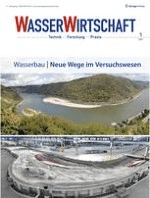
WasserWirtschaft
Navigating the complexities of water science and technology.WasserWirtschaft is a renowned academic journal dedicated to the critical field of water science and technology. Published by SPRINGER VIEWEG-SPRINGER FACHMEDIEN WIESBADEN GMBH, this journal has been a vital resource for researchers, professionals, and students since its inception in 1973, covering an extensive range of topics pertinent to water management, engineering, and environmental sustainability. Although it is currently ranked in the Q4 category of the Water Science and Technology category as per the 2023 Scopus metrics, with a ranking of #246 out of 261, the journal is committed to enhancing the discourse surrounding water resource management through high-quality, peer-reviewed articles. The journal does not operate on an Open Access basis, ensuring that its content is curated and accessible to subscribers while promoting rigorous academic standards. With its historical significance and focus on contemporary water-related challenges, WasserWirtschaft remains an essential publication for stakeholders aiming to advance the science and technology of water resources in a rapidly changing world.

WATER RESOURCES MANAGEMENT
Transforming Challenges into Opportunities in Water ManagementWATER RESOURCES MANAGEMENT is a prestigious journal published by SPRINGER, renowned for its contribution to the fields of Civil and Structural Engineering as well as Water Science and Technology. Operating since 1987, this journal has established itself as a vital resource for researchers, professionals, and students alike, boasting a remarkable impact factor and a Q1 designation in both relevant categories as of 2023. The journal is indexed in Scopus, achieving commendable ranks—34th in Environmental Science and 62nd in Civil and Structural Engineering, placing it in the top percentiles of its fields. Although it does not offer open access, WATER RESOURCES MANAGEMENT serves as a comprehensive platform for disseminating innovative research, discussions, and case studies that address the global challenges of water resource management. With a commitment to fostering knowledge and advancing the understanding of integrated water management solutions, this journal is indispensable for anyone engaged in these critical scientific domains.
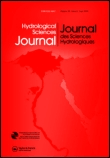
Hydrological Sciences Journal
Exploring the depths of hydrological innovation.Hydrological Sciences Journal, published by Taylor & Francis Ltd, is a leading peer-reviewed publication dedicated to advancing the field of hydrology, spanning topics from water management to climate impacts on hydrological systems. With an impressive impact factor and a noted Q1 category ranking in Water Science and Technology, the journal occupies a pivotal role in the academic landscape, facilitating high-quality research dissemination since its inception in 1982. The journal is indexed in Scopus, holding a commendable rank of #48 out of 261 in the Environmental Science category, placing it in the 81st percentile among its peers. Although it does not offer Open Access options, the journal ensures extensive reach and readership through institutional subscriptions. As it converges toward its milestone of 2024, the Hydrological Sciences Journal remains an indispensable resource for researchers, professionals, and students eager to explore the latest advancements and methodologies in hydrological research.
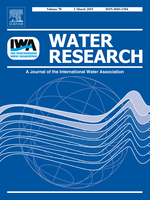
WATER RESEARCH
Empowering researchers to tackle urgent water issues.WATER RESEARCH, published by Pergamon-Elsevier Science Ltd, is a premier international journal dedicated to the advancement of knowledge in the interdisciplinary field of water science and technology. With a significant impact factor, WATER RESEARCH holds a distinguished position, consistently ranking in the top quartile (Q1) across multiple categories including Civil and Structural Engineering, Environmental Engineering, and Pollution. Established in 1967 and set to continue its legacy until at least 2024, this journal provides a vital platform for researchers and professionals to disseminate cutting-edge findings related to water sustainability, quality, and management. Although the journal follows a traditional access model, its commitment to disseminating impactful research ensures that it remains an essential resource for academia and industry alike. With a rigorous selection process, the journal includes articles that significantly contribute to the understanding and resolution of global water-related challenges, making it an invaluable asset for researchers, students, and practitioners engaged in this critical area of study.

Journal of Hydrology and Hydromechanics
Pioneering insights into fluid flow and water systems.Journal of Hydrology and Hydromechanics, published by SCIENDO, is a prominent open access journal that has been disseminating crucial research findings in the fields of fluid flow, mechanical engineering, and water science since its inception in 1973. With its open access model established in 2009, the journal ensures that innovative research is available to a global audience, enhancing the visibility and impact of studies related to hydrological systems and their applications. The journal holds a commendable position within the academic community, reflected in its category quartiles, achieving Q2 rankings in 2023 across key areas such as Fluid Flow and Transfer Processes, Mechanical Engineering, and Water Science and Technology. Its Scopus rankings further highlight its relevance, placing it among the top journals in its categories. The Journal of Hydrology and Hydromechanics not only serves as a vital resource for researchers and professionals aiming to advance hydrological knowledge but also provides students with a wealth of information to better understand the complexities of water dynamics and associated engineering challenges.

Water Practice and Technology
Championing Sustainable Practices in Water ScienceWater Practice and Technology is a distinguished open-access journal published by IWA PUBLISHING, dedicated to disseminating cutting-edge research and practical insights within the field of water science and technology. With an E-ISSN of 1751-231X, the journal has been at the forefront of sharing knowledge since its inception in 2011 and has transitioned to open access in 2021, providing unrestricted access to high-quality research articles. Based in the United Kingdom, this journal plays a vital role in advancing the understanding of water resource management, treatment technologies, and environmental sustainability. As of 2023, it is categorized in the Q3 quartile for Water Science and Technology with a Scopus rank of #157/261, placing it in the 40th percentile among its peers. Researchers, professionals, and students alike will find the journal a valuable resource for the latest trends, innovations, and practical applications in the water sector, facilitating a collaborative approach towards addressing global water challenges.

Tecnologia y Ciencias del Agua
Transforming water challenges into innovative solutions.Tecnologia y Ciencias del Agua is a dynamic and innovative open access journal published by the Instituto Mexicano de Tecnología del Agua, dedicated to advancing knowledge in the fields of civil and structural engineering as well as water science and technology. Since its inception in 1930, the journal has provided a platform for interdisciplinary research and discussion, catering to an audience of researchers, professionals, and students interested in the management of water resources and sustainable engineering practices. With an ISSN of 0187-8336, and an E-ISSN of 2007-2422, this journal has converged its focus from 2010 through 2024, although it currently holds Q4 quartiles in its category as per the 2023 rankings, indicating its evolving role within the global landscape of academic publishing. Despite its emerging status, the journal's commitment to disseminating high-quality, peer-reviewed research on critical topics related to water management and engineering continues to enhance its relevance and appeal. The journal is based in Morelos, Mexico, contributing to the region's rich academic tradition while also engaging with a broader international audience through its extensive open access policy.
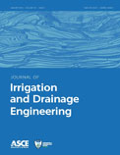
JOURNAL OF IRRIGATION AND DRAINAGE ENGINEERING
Innovating the Future of Irrigation and DrainageJOURNAL OF IRRIGATION AND DRAINAGE ENGINEERING, published by the ASCE - American Society of Civil Engineers, stands as a pivotal resource in the fields of irrigation and drainage engineering. With a rich publication history dating back to 1966 and continuing robustly through to 2024, this journal serves as a critical platform for disseminating innovative research and developments that contribute to effective water management practices. Catering to an audience of researchers, professionals, and students, it holds a notable impact factor within its categories, ranking Q2 in Agricultural and Biological Sciences (miscellaneous) and Q3 in both Civil and Structural Engineering and Water Science and Technology for 2023. This journal not only stimulates dialogue among experts but also addresses pressing global water challenges, promoting sustainable practices in resource management. Although it does not offer open access, the depth of its content and adherence to rigorous academic standards ensure it remains an essential citation for anyone involved in water resource engineering and the applied sciences surrounding agricultural efficiency.